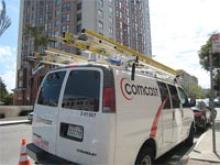Salisbury's Fibrant Launches, TWC Responds With DOCSIS 3
In North Carolina, Salisbury has launched the state's second FTTH network, as communities continue to build the next-generation broadband infrastructure in which their massive incumbent providers decline to invest. We have offered in-depth coverage of Fibrant as they prepared to launch the new services. As of Tuesday, Nov 2, the network softly launched, which is to say they will slowly ramp up the number of paying customers as they gain experience and confidence. Stop the Cap! also covered the launch with extensive coverage as well as both praise and criticism for Fibrant's approach.
Some of the 115 early, free testers of Fibrant became the first paying customers Monday, with the utility scheduling installations for 200 other residents on a waiting list.
A local group has posted a number of videos about Fibrant, including a recent one that compares Fibrant's speeds to the pathetic offering of Time Warner Cable (see bottom of this post). In a totally unrelated development (or so Time Warner Cable would have us believe), TWC has rapidly increased its broadband tiers in the region. In this, TWC has joined Comcast in downplaying the role competition has in forcing incumbent investment. If you believe TWC, competition plays no role in their investment decisions, a fascinating approach to succeeding in an area they constantly claim is a very competitive market.



